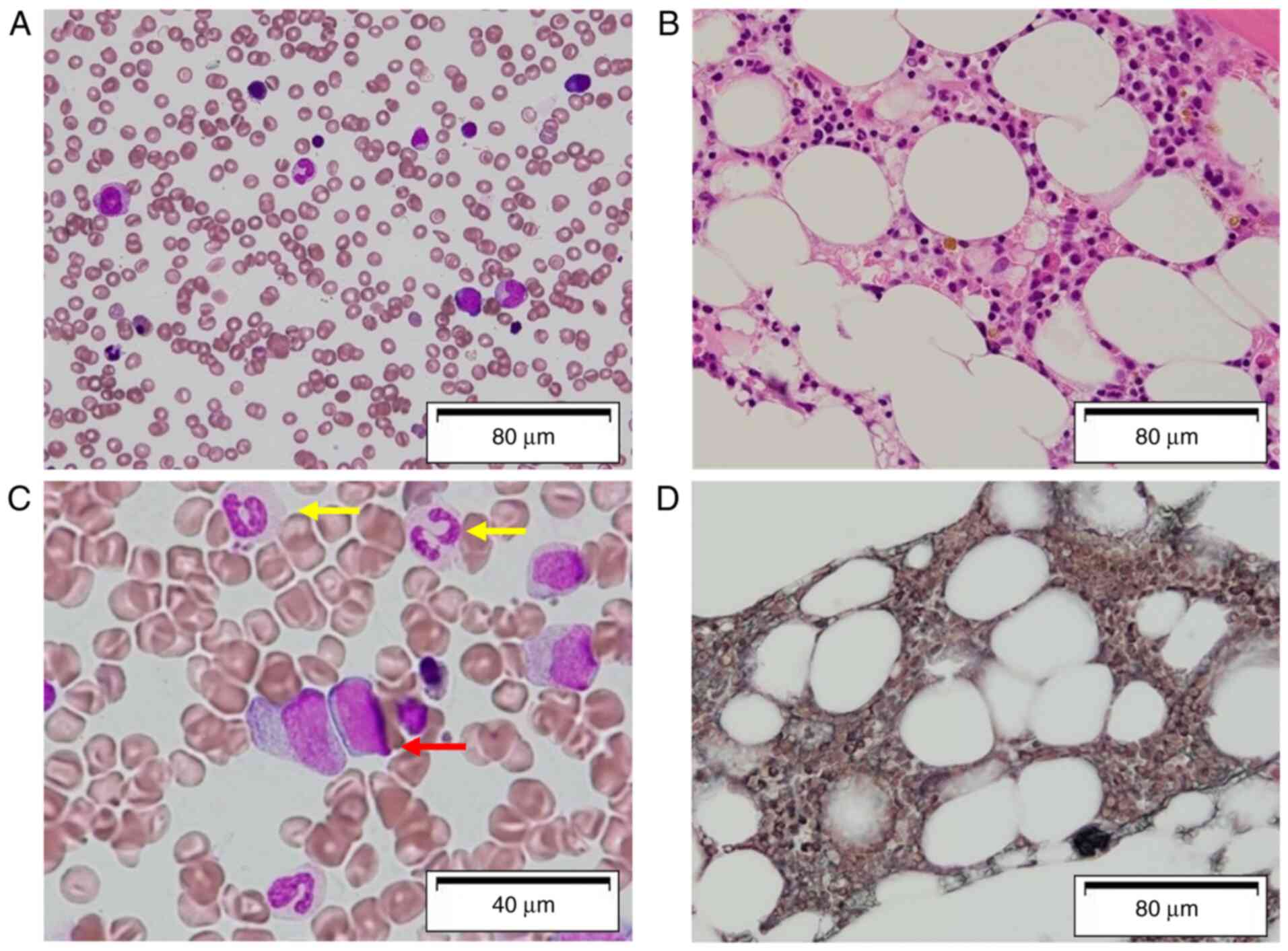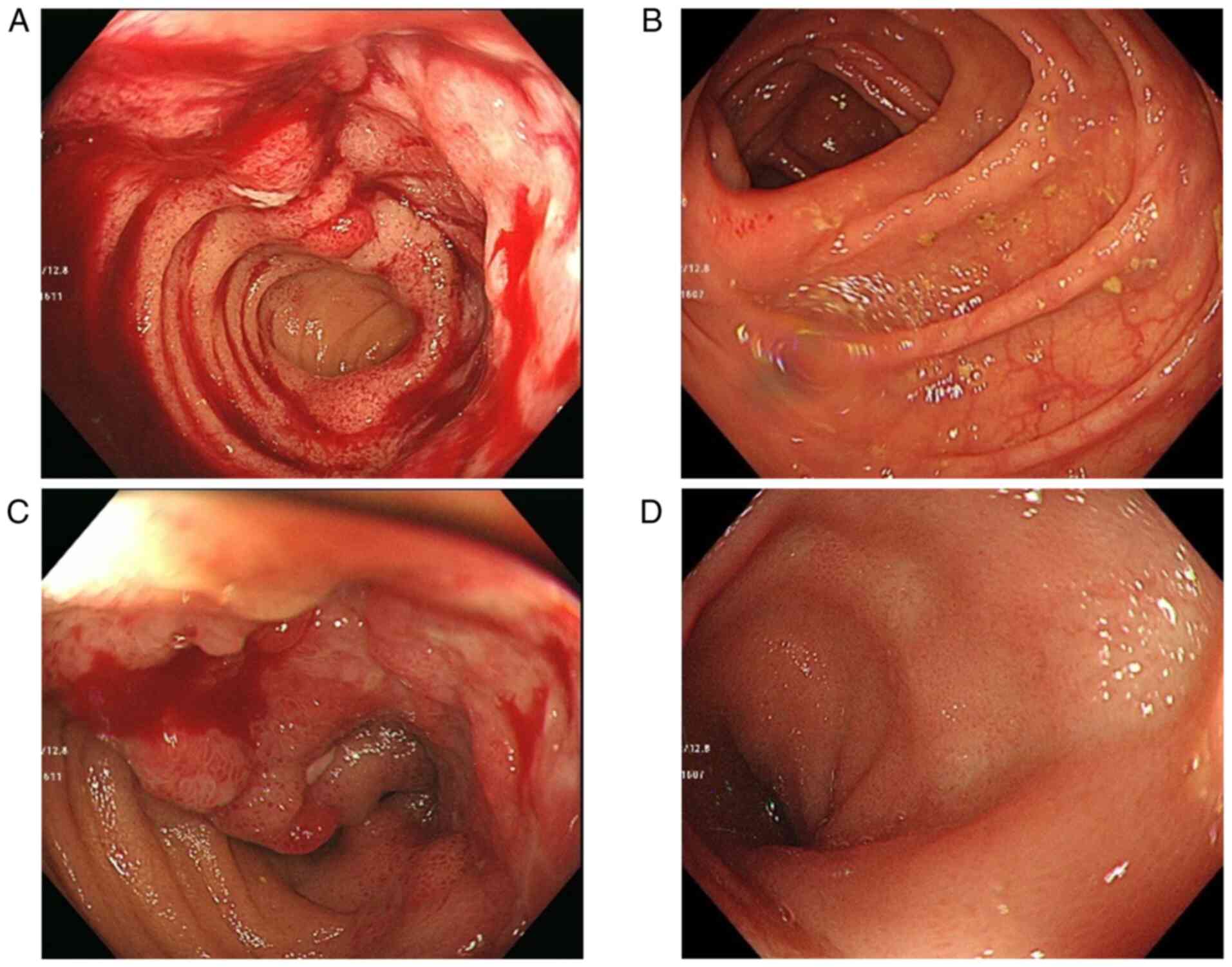|
1
|
Young NS, Calado RT and Scheinberg P:
Current concepts in the pathophysiology and treatment of aplastic
anemia. Blood. 108:2509–2519. 2006.PubMed/NCBI View Article : Google Scholar
|
|
2
|
Tefferi A and Vardiman JW: Myelodysplastic
syndromes. N Engl J Med. 361:1872–1885. 2009.PubMed/NCBI View Article : Google Scholar
|
|
3
|
Wang Z, Zhou Y and Liu Y: Concurrent
inflammatory bowel disease and myelodysplastic syndrome: Report of
nine new cases and a review of the literature. Dig Dis Sci.
53:1929–1932. 2008.PubMed/NCBI View Article : Google Scholar
|
|
4
|
Eng C, Farraye FA, Shulman LN, Peppercorn
MA, Krauss CM, Connors JM and Stone RM: The association between the
myelodysplastic syndromes and Crohn disease. Ann Intern Med.
117:661–662. 1992.PubMed/NCBI View Article : Google Scholar
|
|
5
|
Castellote J, Porta F, Tuset E and Salinas
R: Crohn's disease and the myelodysplastic syndrome. J Clin
Gastroenterol. 24:286–287. 1997.PubMed/NCBI View Article : Google Scholar
|
|
6
|
Bosch X, Bernadich O and Vera M: The
association between Crohn disease and the myelodysplastic
syndromes. Report of 3 cases and review of the literature. Medicine
(Baltimore). 77:371–377. 1998.PubMed/NCBI View Article : Google Scholar
|
|
7
|
Wang H, Chuhjo T, Yamazaki H, Shiobara S,
Teramura M, Mizoguchi H and Nakao S: Relative increase of
granulocytes with a paroxysmal nocturnal haemoglobinuria phenotype
in aplastic anaemia patients: The high prevalence at diagnosis. Eur
J Haematol. 66:200–205. 2001.PubMed/NCBI View Article : Google Scholar
|
|
8
|
Greenberg PL, Tuechler H, Schanz J, Sanz
G, Garcia-Manero G, Solé F, Bennett JM, Bowen D, Fenaux P, Dreyfus
F, et al: Revised international prognostic scoring system for
myelodysplastic syndromes. Blood. 120:2454–2465. 2012.PubMed/NCBI View Article : Google Scholar
|
|
9
|
Malcovati L, Germing U, Kuendgen A, Della
Porta MG, Pascutto C, Invernizzi R, Giagounidis A, Hildebrandt B,
Bernasconi P, Knipp S, et al: Time-dependent prognostic scoring
system for predicting survival and leukemic evolution in
myelodysplastic syndromes. J Clin Oncol. 25:3503–3510.
2007.PubMed/NCBI View Article : Google Scholar
|
|
10
|
Hiraoka A, Ohashi Y, Okamoto S, Moriyama
Y, Nagao T, Kodera Y, Kanamaru A, Dohy H and Masaoka T: Japanese
FK506 BMT(Bone Marrow Transplantation) Study Group. Phase III study
comparing tacrolimus (FK506) with cyclosporine for
graft-versus-host disease prophylaxis after allogeneic bone marrow
transplantation. Bone Marrow Transplant. 28:181–185.
2001.PubMed/NCBI View Article : Google Scholar
|
|
11
|
Sun L and Babushok DV: Secondary
myelodysplastic syndrome and leukemia in acquired aplastic anemia
and paroxysmal nocturnal hemoglobinuria. Blood. 136:36–49.
2020.PubMed/NCBI View Article : Google Scholar
|
|
12
|
Saif MW, Hopkins JL and Gore SD:
Autoimmune phenomena in patients with myelodysplastic syndromes and
chronic myelomonocytic leukemia. Leuk Lymphoma. 43:2083–2092.
2002.PubMed/NCBI View Article : Google Scholar
|
|
13
|
Braun T and Fenaux P: Myelodysplastic
syndromes (MDS) and autoimmune disorders (AD): cause or
consequence? Best Pract Res Clin Haematol. 26:327–336.
2013.PubMed/NCBI View Article : Google Scholar
|
|
14
|
Shimamoto T and Ohyashiki K:
Immunosuppressive treatments for myelodysplastic syndromes. Leuk
Lymphoma. 44:593–604. 2003.PubMed/NCBI View Article : Google Scholar
|
|
15
|
Hanauer SB, Wong KK, Frank PH, Sweet DL
and Kirsner JB: Acute leukemia following inflammatory bowel
disease. Dig Dis Sci. 27:545–548. 1982.PubMed/NCBI View Article : Google Scholar
|
|
16
|
Nahas SC, Nahas CS, Marques CF, Borba MR,
Helito AS and Odoni V: Concurrent development of Crohn disease and
myelodysplastic syndrome in a child: Case report and literature
review. Pediatr Hematol Oncol. 23:477–483. 2006.PubMed/NCBI View Article : Google Scholar
|
|
17
|
Harewood GC, Loftus EV Jr, Tefferi A,
Tremaine WJ and Sandborn WJ: Concurrent inflammatory bowel disease
and myelodysplastic syndromes. Inflamm Bowel Dis. 5:98–103.
1999.PubMed/NCBI View Article : Google Scholar
|
|
18
|
Hebbar M, Kozlowski D, Wattel E, Mastrini
S, Diévart M, Duclos B, Bonaz B, d'Almagne H, Belaiche J, Colombel
JF and Fenaux P: Association between myelodysplastic syndromes and
inflammatory bowel diseases. Report of seven new cases and review
of the literature. Leukemia. 11:2188–2191. 1997.PubMed/NCBI View Article : Google Scholar
|
|
19
|
Hamblin T: Immunologic abnormalities in
myelodysplastic syndromes. Hematol Oncol Clin North Am. 6:571–586.
1992.PubMed/NCBI
|
|
20
|
Molldrem JJ, Jiang YZ, Stetler-Stevenson
M, Mavroudis D, Hensel N and Barrett AJ: Haematological response of
patients with myelodysplastic syndrome to antithymocyte globulin is
associated with a loss of lymphocyte-mediated inhibition of CFU-GM
and alterations in T-cell receptor Vbeta profiles. Br J Haematol.
102:1314–1322. 1998.PubMed/NCBI View Article : Google Scholar
|
|
21
|
Hu C, Lv L, Liu D and Huo J: Treatment of
Crohn's disease complicated with myelodysplastic syndrome via
allogeneic hematopoietic stem cell transplantation: Case report and
literature review. Clin J Gastroenterol. 7:299–304. 2014.PubMed/NCBI View Article : Google Scholar
|
|
22
|
Passweg JR, Baldomero H, Bregni M, Cesaro
S, Dreger P, Duarte RF, Falkenburg JH, Kröger N, Farge-Bancel D,
Gaspar HB, et al: Hematopoietic SCT in Europe: Data and trends in
2011. Bone Marrow Transplant. 48:1161–1167. 2013.PubMed/NCBI View Article : Google Scholar
|
|
23
|
Duijvestein M, van den Brink GR and Hommes
DW: Stem cells as potential novel therapeutic strategy for
inflammatory bowel disease. J Crohns Colitis. 2:99–106.
2008.PubMed/NCBI View Article : Google Scholar
|
|
24
|
Ditschkowski M, Einsele H, Schwerdtfeger
R, Bunjes D, Trenschel R, Beelen DW and Elmaagacli AH: Improvement
of inflammatory bowel disease after allogeneic stem-cell
transplantation. Transplantation. 75:1745–1747. 2003.PubMed/NCBI View Article : Google Scholar
|
|
25
|
Sorror ML, Maris MB, Storb R, Baron F,
Sandmaier BM, Maloney DG and Storer B: Hematopoietic cell
transplantation (HCT)-specific comorbidity index: A new tool for
risk assessment before allogeneic HCT. Blood. 106:2912–2919.
2005.PubMed/NCBI View Article : Google Scholar
|
















